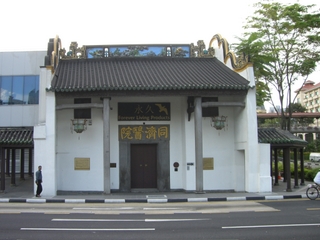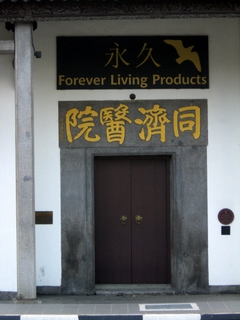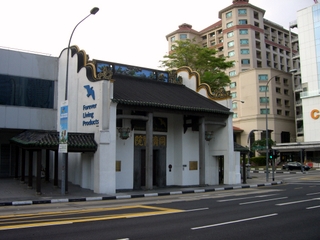 Each time, as I drive past this unique building, a beauty amongst the beasts, I could not help thinking back of the days when its front could not even be seen from the road. In the old days, my young days, there was a big colony of food stalls just in front of the Tong Chek Yi Yii (as spoken in Hokkien, and often, we just called it Tong Chek Yi), selling all the delicious food. At my time, when one mentioned Tong Chek Yi, food came to my mind. Not the free TCM (traditional Chinese medicine) that it was offering to the locals.
Each time, as I drive past this unique building, a beauty amongst the beasts, I could not help thinking back of the days when its front could not even be seen from the road. In the old days, my young days, there was a big colony of food stalls just in front of the Tong Chek Yi Yii (as spoken in Hokkien, and often, we just called it Tong Chek Yi), selling all the delicious food. At my time, when one mentioned Tong Chek Yi, food came to my mind. Not the free TCM (traditional Chinese medicine) that it was offering to the locals.From what I heard, the Tong Chek Yi of yesteryears was also a refuge for the dying. Till this
 day, Tong Chek Yi Yii is still doing a wonderful community service, in a much bigger building, a short distance away, where the kaling (mynah) flies. But this beauty, deserted and left to fan for herself, has lost her soul. She is still crying out for the right one to give her back her soul.
day, Tong Chek Yi Yii is still doing a wonderful community service, in a much bigger building, a short distance away, where the kaling (mynah) flies. But this beauty, deserted and left to fan for herself, has lost her soul. She is still crying out for the right one to give her back her soul.It was in 1978 or thereabout when I brought this German couple, their first trip to Singapore - and we, chik jia kuey chik jia ark (one chicken and one duck), to this place to try local hawker food. I was naive then to believe that because I did not get food poisoning, they would not. Luckily, they did not. We had sugar cane juice freshly crushed but their favourite was pineapple juice. Lo-meh (the Cantonese spread of a wide variety of different food eaten after dipping in sauce, like the Hokkien Gor Hiang Hay Piah) was probably the attraction there with their bright lights, and well, sometimes, colourful speeches from the stallholders.
 Tong Chek Yi 'Square' was the "opening" to an interesting part of Singapore, known to the Teochews (this place is the Teochew part of Chinatown) as Cha Chun Tao (the wooden boat quay in Teochew). I remember the wonderful Teochew Raw Fish, a different and lesser known version of Chinese raw fish, being sold at his old kopitiam (coffeeshop). Those interesting scenes of ancient Singapore are but memories. Thanks to this wonderful Singapore watcher, Ronni Pinsler, you can get to see many pictures of this part in the National Heritage Board Archive website.
Tong Chek Yi 'Square' was the "opening" to an interesting part of Singapore, known to the Teochews (this place is the Teochew part of Chinatown) as Cha Chun Tao (the wooden boat quay in Teochew). I remember the wonderful Teochew Raw Fish, a different and lesser known version of Chinese raw fish, being sold at his old kopitiam (coffeeshop). Those interesting scenes of ancient Singapore are but memories. Thanks to this wonderful Singapore watcher, Ronni Pinsler, you can get to see many pictures of this part in the National Heritage Board Archive website.
No comments:
Post a Comment